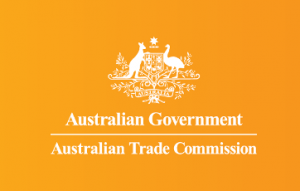You can have a little laugh if you like but we weren’t kidding
About two years ago, after I’d been engaged by the board of an Australian technology company as their consulting CMO, I was introduced by the managing director to the chairman-of-the-board for the first time.

I discovered that when you hang out with heavyweights in Melbourne, you might meet a Federal Treasurer.
My intial meeting with the chairman happened over coffee in Melbourne, in surroundings so distinguished that I got to shake hands with the Treasurer of Australia, fleetingly, only because I was moving in these elite circles with this MD and chairman. You can take it from here that these guys – the ones in my party – are well-connected heavyweights and in no way naive.
We took plush seats at a refined table. After a bit of rapport-banter, the chairman asked me, “So, what is your vision for the company as a marketer?” Stirring my latte, and without skipping a beat, I said, “World domination.”
The chairman had a little chuckle over his petit four. “Seriously,” he said as if I’d been joking around up to this point, “Where do you see yourself taking the company’s marketing over the next few years?” I looked across at the MD, my champion in proposing our services to the other directors of the company, and asked earnestly, “Is there anything wrong with what I just said?”
The MD, one of the cleverest, gamest, and most candid people I’ve ever met in the business world, grinned and said, “Nope. It’s all good with me.” I turned to the chairman again, steeled by the MD, and repeated, “World domination.”
Why some people still think global B2B markets are too costly to access

Aussie businesses may recoup up to 50% of what they’ve spent on overseas marketing via Austrade’s EMDG.
In my field, working at C-level across different B2B sectors, I’m sometimes invited to participate in workshops and think-tanks aimed at improving Australia’s B2B export marketing capabilities. For the facilitators to get full value out of their agenda, I’ll listen through all the usual suggestions for businesses like: “Find out which trade show or industry event would be most relevant to your prospective buyers in the overseas country you’re targeting, set up a stand at the next one, and collect leads. If you get enough leads, you could go ahead and set up an office over there. And you could recoup up to 50% of expenses like these under the Australian Government’s Export Market Development Grant (EMDG).”
While the EMDG can really help Aussie businesses to fund their forays into overseas markets, the traditional approach to going out and getting ’em in other countries is way too costly and iffy for my liking. Not that I’ve got anything against industry events in any country, they’re great (if you’ve got the budget, because even if you get 50% back, you’ve got to cop the other 50%). Attend one event and you’ve introduced yourself to one market; one region. How much would it cost, and how long would it take, to get around them all?
Meeting demand in global B2B markets through digital strategy
Coming back to the company at the start of this story, I won’t freely publicise what we did in our digital strategy that started the flow of inbound enquiries from all over the world sent by people wanting to find out about (or become agents for) their products. This happened within the first two years of our program.

We help Aussie companies to rise and meet with demand in B2B export markets.
What we did wasn’t as simple as running pay-per-click advertising (“PPC” eg: Google AdWords) in different regions. With high-value products and services, the cost-per-click in many countries can get very expensive. Just like with poker machines and other forms of gambling, the PPC ‘fun’ stops as soon as your credit runs out.
What we did represented a lasting investment for this company, with sufficient signs of ROI in the first stretch for them to keep going into the second and beyond. We’re learning from the number and quality of inbound enquiries which regions show the greatest potential and viability for selling their products, without anyone leaving home. We’re connecting with demand in most corners of the globe at around the same annual cost as appearing at just one industry event.
Claiming for export-related marketing under the EMDG
The good news from the Australian Government is that the cost of work done by marketing consultants to develop and execute strategies for generating leads in other countries may be recouped (up to 50%) under the Export Market Development Grant program (conditions apply).

Your EMDG consultant might look like Evan Widmonte of Rimon Advisory.
Firstly, you need to engage a B2B marketing agency (like ours!) to help achieve your ‘world domination’, because the cost of marketing-related employees in your local office doesn’t qualify for the EMDG.
Next, you can talk to an EMDG consultant to confirm that your export-related marketing efforts could be claimable, and what extensions or limitations might apply in your case.
We’re not affiliated with any EMDG consultant but I’ve met Evan Widmonte of Rimon Advisory working on an export-related project and he was very generous with detailed preliminary information and his time. You could Google him or find any other consultant you like.
Winning B2B marketing ‘believers’ with globally-derived results
As for the well-connected chairman who initially laughed over my plans for ‘world domination’, we forged a great working relationship based on mutual respect once some leads started rolling in. Genuine, qualified inbound enquiries from the UK, North America, Africa, and Middle East showed that the company had indeed expanded its horizons from local to global without ‘playing the pokies’ (PPC) or knocking on doors.
Still, effective marketing is only part of any B2B company’s global success story. Languages, service delivery, and trust are just some of the challenges to be addressed for the picture of global success to become complete. There’s a lot of learning to do. But at least when overseas enquiries are arriving regularly, companies and staff can gain experience and they’ll keep getting better at converting our offshore leads into their export sales.
- This is a true story – most names are not mentioned due to commercial sensitivity – sign our NDA for full case studies
- Image of the Treasurer of Australia (2018-) by Julian Meehan, Melbourne








